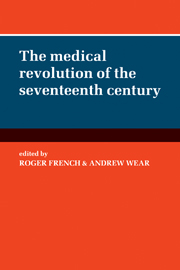Book contents
- Frontmatter
- Contents
- List of contributors
- Acknowledgements
- Introduction
- 1 Medicine, religion and the puritan revolution
- 2 Harvey in Holland: circulation and the Calvinists
- 3 The matter of souls: medical theory and theology in seventeenth-century England
- 4 Mental illness, magical medicine and the Devil in northern England, 1650–1700
- 5 Passions and the ghost in the machine: or what not to ask about science in seventeenth- and eighteenth-century Germany
- 6 Thomas Sydenham: epidemics, experiment and the ‘Good Old Cause’
- 7 The medico-religious universe of an early eighteenth-century Parisian doctor: the case of Philippe Hecquet
- 8 Isaac Newton, George Cheyne and the Principia Medicinae
- 9 Physicians and the new philosophy: Henry Stubbe and the virtuosi-physicians
- 10 The early Royal Society and the spread of medical knowledge
- 11 Medical practice in late seventeenth-and early eighteenth-century England: continuity and union
- Index
2 - Harvey in Holland: circulation and the Calvinists
Published online by Cambridge University Press: 05 January 2012
- Frontmatter
- Contents
- List of contributors
- Acknowledgements
- Introduction
- 1 Medicine, religion and the puritan revolution
- 2 Harvey in Holland: circulation and the Calvinists
- 3 The matter of souls: medical theory and theology in seventeenth-century England
- 4 Mental illness, magical medicine and the Devil in northern England, 1650–1700
- 5 Passions and the ghost in the machine: or what not to ask about science in seventeenth- and eighteenth-century Germany
- 6 Thomas Sydenham: epidemics, experiment and the ‘Good Old Cause’
- 7 The medico-religious universe of an early eighteenth-century Parisian doctor: the case of Philippe Hecquet
- 8 Isaac Newton, George Cheyne and the Principia Medicinae
- 9 Physicians and the new philosophy: Henry Stubbe and the virtuosi-physicians
- 10 The early Royal Society and the spread of medical knowledge
- 11 Medical practice in late seventeenth-and early eighteenth-century England: continuity and union
- Index
Summary
INTRODUCTION
The aim of this volume is to relate medicine to the wider historical issues of the seventeenth century, particularly religion and politics. This is not simply to provide a context or background, and this chapter is written on the assumption that these wider issues – questions of men's religious beliefs and of the way in which men were to be governed – had a selective influence on what (and how) they absorbed of new medical doctrines. If this assumption is valid, it must descend from the religious and political through the external institutional arrangements of medicine to the details of medical theory. And of all medical theory, the doctrine of the circulation of the blood is one of the most difficult to see in this kind of relationship with religious and political history. Indeed, Harvey has generally been seen by historians as self-evidently right, and those who did or did not accept the circulation are placed on a scale from the hapless Primrose upwards according to their ability to recognize the truth when they saw it. But what people made of Harvey's doctrine depended partly on how they came across it, and partly on what was already in their minds – whether intellectual or not – which predisposed them to accept or reject it, or parts of it. The result was that most people's idea of what Harvey said was different, sometimes very different, from what Harvey wrote in De Motu Cordis.
- Type
- Chapter
- Information
- The Medical Revolution of the Seventeenth Century , pp. 46 - 86Publisher: Cambridge University PressPrint publication year: 1989
- 2
- Cited by



